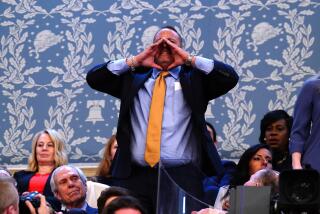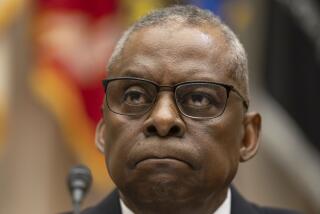Platoon commander says he gave order to ‘clear’ Iraqi house
Reporting from Camp Pendleton -- The former Marine officer who gave Staff Sgt. Frank Wuterich the order to “clear” an Iraqi house near the site of an explosion that had just killed a Marine testified Friday that he expected Wuterich and his squad to “kill or capture the enemy I thought was in that building.”
William Kallop, who was a lieutenant in 2005 and is now a stockbroker in New York, said he believed insurgents inside the house were firing on Marines and thus the house could be deemed “hostile.”
According to the rules of engagement, Wuterich and his Marines were justified in using any amount of firepower in assaulting a “hostile” structure without identifying whether the people inside were combatants, Kallop said.
Kallop’s testimony came at the court-martial of Wuterich on charges of manslaughter, assault and dereliction of duty in the killing of 24 Iraqis by Marines on Nov. 19, 2005, in the Euphrates River community of Haditha. Among the Iraqis killed were three women and seven children.
While Kallop, who was a platoon commander, was called as a prosecution witness, his testimony appears to support the defense contention that Wuterich followed both his orders and training in assaulting two houses after the explosion that killed Marine Cpl. Miguel Terrazas and injured two other Marines.
The jury comprises four officers and four senior enlisted personnel, all with combat experience in Iraq or Afghanistan or both, as well as experience in “clearing” houses.
A Marine lawyer, testifying after Kallop, gave a different interpretation of the rules of engagement. Maj. Kathryn Navin, who had lectured Marines before they deployed, said a house cannot be declared hostile unless the people inside are known to have “hostile intent” or have committed “hostile acts.”
But Kallop said that in training at Camp Pendleton and March Reserve Air Base, and at briefings delivered in Iraq, Marines were not told they needed to identify individual targets as threatening when assaulting a “hostile” structure.
He said that he ordered “Clear south” and Wuterich responded, “Roger that, Sir.” He did not tell Wuterich that the house was “hostile,” Kallop said.
But Wuterich, in gathering his squad for the assault, told one of the Marines that the house was hostile and that the Marines should shoot first and ask questions later, according to testimony from former Marine Stephen Tatum.
No insurgents or weapons were found in two houses “cleared” by Marines. Dozens of Jordanian passports and stacks of American hundred-dollar bills were found in another house, however, indicating the neighborhood may have been used by insurgents as a staging point for attacks, Marine intelligence officers testified at preliminary hearings.
Kallop testified that after the explosion that ripped apart a Humvee, Marines were under attack by “a few bursts of small-arms fire.” He said he ordered a Marine to fire a grenade at the house after seeing a “turkey-peeker,” military jargon for a military-age male sneaking a look at Marines in a suspicious manner.
Kallop said he expected Wuterich to lead the Marines in his squad “to conduct movement to contact and kill or capture the enemy I thought was in that building.”
While Wuterich and other Marines had searched hundreds of Haditha homes in previous weeks, the “clearing” on Nov. 19 was the first time they had been ordered to do so after being attacked. The clearing operation that day, Kallop said, was “more elevated and more hostile.”
When Wuterich returned from the houses, he reported that he had “fragged it and cleared it,” Kallop said.
While in the first house, Wuterich yelled to his Marines that someone was running to a second house, Tatum said. The Marines followed and the killing continued.
“Once you declare a building hostile, you can destroy it with all means at your disposal,” including tanks and aircraft, Kallop said. “I expected the enemy was in that area and I expected [Staff] Sgt. Wuterich to engage it.”
Responding to a question from defense attorney Haytham Faraj, Kallop said Marines are not required to risk their lives by stopping to identify individual targets while assaulting a hostile structure.
Tatum testified Tuesday that once inside the first house, Marines fired M-16s and hurled grenades. Once the Marines started firing, smoke and dust made it impossible to identify the ages or genders of the people in the house, he testified.
Eight Marines were charged in the Haditha killings: four enlisted Marines charged with killing the Iraqis, four officers charged with failing to launch a war-crimes investigation. Charges were dismissed against six of the Marines, including Tatum, who agreed to testify in exchange. One officer was found not guilty at a court-martial.
Kallop testified that Wuterich, on his combat deployment, was “tactically and technically proficient.”
On Wednesday, a Marine sergeant testified Wuterich had once said that if his squad was ever attacked, “we’re going to kill everyone in sight.” But a former Marine testified Thursday that the sergeant is an habitual liar.
More to Read
Start your day right
Sign up for Essential California for news, features and recommendations from the L.A. Times and beyond in your inbox six days a week.
You may occasionally receive promotional content from the Los Angeles Times.






